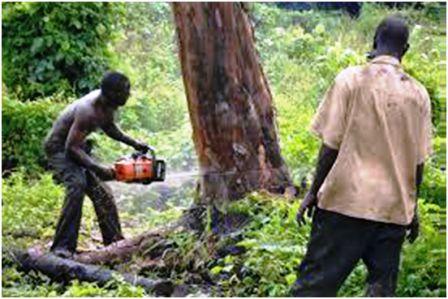Saving money and the environment: the way to go for Malawian Chicken Farmers
Growing up in the Malawian rural village in early 1980s used to be refreshing as we were always surrounded by green and fresh vegetation. Without paying for them, we munched indigenous fruits such as Masuku (Uapaca kirkiana), Mbula (Parinari curatellifolia), Matyokolo (Flaucortia indica) and Kabeza (Strychnos cocculoides). Talking to one of my old friends, he insinuated that, by eating these indigenous fruits we could not suffer from peculiar diseases being manifested these days. The biggest question one may ask, where have those great trees gone? I guess they have all gone into extinction without anybody noticing and caring what has been going on around us.
Wood Saw miller cutting down a tree trunk, which took years to grow but does not care where to get another one tomorrow!
Working on a BIF funded project in Lilongwe recently exposed me to how a simple business like chicken farming has been contributing towards the depletion of our beautiful forests. Not only degrading the environment but also leading to a loss of income for the farmer, when simple intervention could lead to significant cost saving. This is a story about a chicken brooding technology (process of providing heat to young chicks from the time they are a day old until they are about two to three weeks old). Malawian chicken farmers have been using charcoal to provide fuel for heat during chicken brooding.
Charcoal being transported to consumers including chicken farmers
Learning from flue cured tobacco farmers, Charles Stewart Day Old Chicks (CSDOC), a company founded 43 years ago in Malawi, based in Blantyre but also with offices in Lilongwe and Mzuzu with a main business of selling day old chicks and also breeding stock chickens, working in collaboration with other stakeholders, have decided to introduce a fuel efficient chicken brooding technology: ‘Rocket Chicken Brooder (RCB)’. Clioma, an environmental consultancy, developed this furnace technology which primarily involves installing a furnace with associated chimney and flue metal pipes to the existing chicken brooder.
The RCB System in place at CSDOC Farm
By introducing this technology, initially to its own incubators and then to other poultry farmers in Malawi, CSDOC is anticipating that the farmers will be able to save both costs of production and environment. Ten thousand farmers are being targeted. The technology reduces the wood equivalent volume required for heating a brooder by 90 per cent. At the same time, charcoal is inefficiently processed and sells at much higher price than wood. You need 6 Kg of wood to produce 1 Kg of charcoal and I ton of charcoal costs 10 times more than 1 ton of firewood! CSDOC will aim to wean chicken farmers off charcoal and onto fuel-efficient RCB system. It is expected that 5,000 tons of carbon equivalent per annum will be saved by these farmers, representing 78 per cent reduction in carbon emission from this sector within 2-3 years.
Lots of wood waste in Chikangawa Forest(Northern Malawi) which chicken farmers can use
Yes, there is a need to think about the welfare of chickens like any other animal welfare. However, some methods like using charcoal have disastrous effect which can make someone lose his treasure for entire life, like me permanently losing my delicious indigenous fruits forever in our village! Despite the risk of technology failure in the RCB system because poor workmanship and the need for buy-in from the local chicken farmers for them to switch from their old habit of using charcoal, the technology offers a great solution for saving both money and the local environment. In order to address the two risk factors, CSDOC is seeking further grant funding in order to carry out a holistic behavioural change campaign (which will include demand driven subsidies) and to carry out further research and development.



